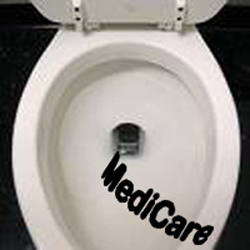
What is going on with MediCare? Some advocate its expansion as a solution for our healthcare woes. Meanwhile, more and more providers are refusing to see MediCare patients. Recent reports suggest that the recession is killing MediCare.
MediCare was passed into law in 1964. At that time, health insurance was available only through one's employer. Therefore, people over or under the working age range were excluded. MediCare and MediCaid were intended to close this gap for retirees and children respectively. The Programs were then greatly expanded to include categories of disease such as HIV, and other parts of our population such as indigents and those below the poverty line.
MediCare and MediCaid, though now considered identical entitlements, were initially quite different. MediCaid was a straight entitlement, a means-based government supported Program. MediCare was supposed to fund itself. The worker paid into the MediCare Trust while working and after retirement, received financed-by-oneself-in-advance health services.
MediCare is fatally flawed for three reasons.
1)The designers predicted MediCare's future needs...badly, a little like the brilliant mathematical models that got us into this recession. Twenty-five years after MediCare was passed, the GAO compared the projected costs to the actual costs. The Program cost over 800% more than predicted. In essence, we were putting in $500 per year and then expected 25 years later, to take out $250, 000 for our heart transplant. [Do the math: 25 times $500 = $12,500 does not come close to a quarter of a million at any realistic compounding rate.]
2)The MediCare Trust was intended to be a separate "lockbox," accounted and maintained separately so everyone could see what was happening. But just like social security, it was rolled into the General Fund, transparency vanished, and the money was used for whatever the Federal government wanted.
3)Most important, there is micro-economic disconnection. Supply and demand cannot balance when one - demand for services - is unlimited (or variable) and the other - supply of money - is fixed, even declining. Anyone who has ever balanced a checkbook knows this but apparently, our government does not.
With fixed supply-unlimited demand, MediCare is balancing its books the only way it can: by spending less. So, to "reduce costs," MediCare pays less and less for services. In New Mexico, a new patient visit to a general physician generates a bill of $171. Actual payment by MediCare is $68. Given all the fixed expenses to practice medicine, are you surprised that doctors everywhere are increasingly refusing to accept MediCare patients? Caring for them is a sure road to economic suicide.
Recent reports of the MediCare Trust suggest that it is going broke faster than anticipated due to the recession. This is true, but we must remember that the Program was non-survivable from the outset. When supply and demand are disconnected, there can never be balance. Consider this as a cautionary tale in light of two recent solutions offered for the continuing healthcare cost crisis.
Cautionary Tale
President Obama suggested that 'competition among providers will deliver quality care and save money.' He means we can save money when the lowest bidder wins. Is that how you want to choose your provider? Oh, and who will bid for mandated services where there is no payment? Rhetorical question: the answer is no one.
More ominous, competing on price means that we continue to focus only on next month's budget, not long term net. The short-term time line is a large part of why we are in trouble now. Healthcare should be treated like an investment, not a line item expense.
In the past few days, healthcare leaders (I use that term very loosely) have promised to save $2 trillion over the next ten years. What psychedelic drugs are they on? How do they propose to do this without reducing payments to nothing and cutting services? Wait, I know! Every analysis of healthcare spending shows that 30-50% is devoured by the bureaucracy, which translates to at least $500 billion per year. They could save the entire $2 trillion in just four years [$500b*4=$2tr] by simply eliminating all middlemen jobs, including themselves!!
I am ranting this way in order to make a clarion point. Central control of healthcare does not work. Adjusting the current system, no matter how much we tweak it, cannot provide needed services with a financially stable balance of supply and demand. Wherever it has been tried, it has failed or is failing. [Before someone throws some so-called universal health care system as a workable model for us, note that the Province of Quebec, Canada spends 43% (!) of its total yearly budget on healthcare.] Instead of rearranging deckchairs on the Titanic, we need to design a new system. It is that simple, that scary and that hard.
Central control of U.S. healthcare can never work.
We need a new system, one that we design.